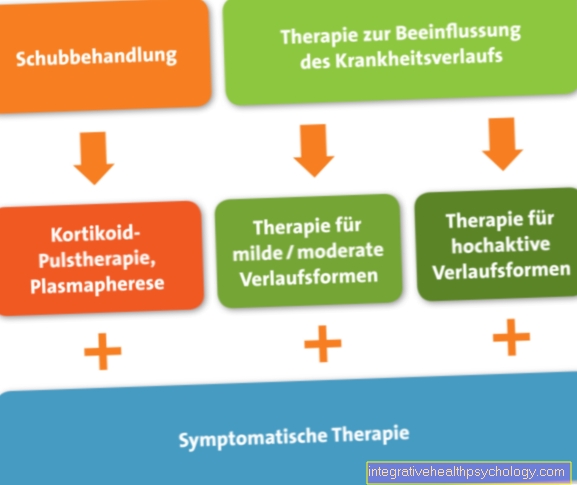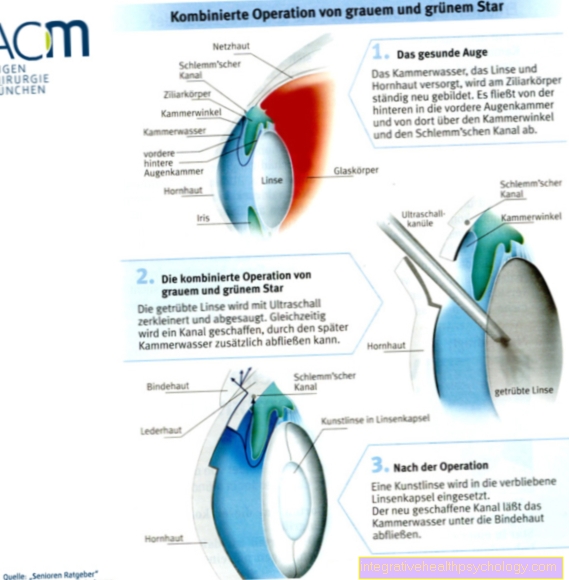Symptoms of vocal cord inflammation
introduction
Especially people who speak a lot and often (e.g. singers or teachers) fear vocal cord inflammation. But even during the cold season, many people suffer from the annoying illness due to colds.
There are a number of characteristic symptoms by which one can easily identify vocal cord inflammation. If a vocal cord inflammation is suspected, those affected must protect their voices. If problems persist, see an ENT doctor who can treat the inflammation and symptoms.

These are the typical symptoms of vocal cord inflammation
Vocal cord inflammation causes a number of typical symptoms. These include:
- Hoarseness (dysphonia)
- deep or scratchy voice
- Pain when speaking
- Loss of voice (aphonia)
- "Lump in throat
- Feeling of swelling in the throat ("thick neck")
- Coughing force
- difficulties swallowing
- Sore throat
- Slime formation
- Throat irritation
- Larynx pain
- fever
- Exhaustion and tiredness
- general feeling of illness
- in severe cases shortness of breath
You can find out about other typical symptoms of vocal cord inflammation here: These are the typical symptoms of vocal cord inflammation
Vocal cord inflammation and hotness
The characteristic symptom of vocal cord inflammation is hoarseness and loss of voice. First of all, those affected feel a strong scratchy throat, which quickly leads to hoarseness. This causes the voice to suffer and in some cases it can lead to complete loss of voice (Aphonia) come.
The inflammation of the vocal cords causes the vocal cords to swell and can no longer vibrate freely, which leads to problems with speaking and hoarseness.
Read more on the topic: Why is the voice often gone when I have a cold?
Hoarseness is usually harmless and disappears by itself after a few days if the voice is spared. Hoarseness that persists for weeks or recurring loss of voice should, however, urgently be examined by a doctor.
To treat hoarseness, it helps to drink enough fluids in the form of warm herbal teas or still water. This moisturizes the mucous membranes and vocal cords. Inhalation and gargle solutions also support rapid healing. Drug treatment of hoarseness in vocal cord inflammation is not necessary in most cases.
Read more on the topic: Medicines for hoarseness
Sore throat
In most cases, inflammation of the vocal cords is accompanied by a severe sore throat. The sick complain of swallowing problems and a swollen "thick" throat that feels rough and hurts.
A tried and tested home remedy for a sore throat and hoarseness is onion juice. An onion is cut into small pieces, poured with hot water and sweetened with honey. Sage candies and warm herbal tea also alleviate the symptoms.
Read more about this at: A Sore Throat - How To Get Rid Of It Quickly! and sore throat when swallowing
Larynx pain
Vocal cord inflammation can also lead to inflammation of the larynx. In addition to hoarseness and coughing, laryngeal pain also occurs. In the case of laryngitis, the voice must be spared and loud speaking, singing or screaming should be avoided.
In addition, neither cigarettes nor alcohol should be consumed as this further irritates the larynx. In contrast to inflammation of the vocal cords, a laryngitis always requires medication, as otherwise a chronic form can quickly develop. The doctor prescribes anti-inflammatory drugs such as Ibuprofen or, in the case of bacterial infection, antibiotics.
Read more on the topic: Larynx - what to do? or Recognize and treat laryngitis in children
Coughing force
In the case of vocal cord inflammation, those affected are constantly forced to clear their throat. The sick feel a "lump" in the throat and try to get rid of the foreign body sensation by repeatedly clearing their throat and coughing. In addition to hoarseness, the compulsion to clear the throat is one of the first signs of vocal cord inflammation.
Frequent throat clearing is a vicious circle, because even after the inflammation has healed, many people are forced to clear their throat. Permanent clearing of the throat can also lead to complications in the long run. For example, this can cause the vocal cords to lose elasticity and their ability to vibrate is limited. Therefore, if you have vocal cord inflammation, you should try to avoid frequent clearing of your throat.
You might also be interested in: Vocal cord nodules
Increased salivation
Inflammation of the vocal cords can turn into inflammation of the larynx. Those affected usually have an increased flow of saliva (Hypersalivation). There is often an uncontrolled leakage of saliva from the mouth (Sialorrhea). The sick people perceive the heavy salivation and sialorrhea as "drooling" and perceive the situation as stressful.
After the inflammation has healed, the flow of saliva regulates itself and an explicit treatment with medication is not necessary.
difficulties swallowing
As difficulty swallowing (or Dysphagia) refers to any kind of problems during the swallowing process. Swallowing disorders often occur as part of an inflammation of the vocal cords and arise from the swollen and inflamed vocal cords at the entrance to the windpipe. In the case of vocal cord inflammation, they are usually associated with a sore throat and a foreign body sensation in the throat ("lump in the throat").
Read more on the topic: Causes of difficulty swallowing
Swallowing difficulties are very uncomfortable, but they can be treated well with simple home remedies. Those affected should drink plenty of fluids, as this moisturizes the mucous membrane of the throat. Warm teas made from medicinal herbs (e.g. sage or thyme) also alleviate the symptoms. With vocal cord inflammation, it is generally important to keep the neck warm with warm wraps or scarves. Difficulty swallowing can also be relieved by warmth.
Read more about this at: Home remedies for swallowing complaints
Vocal cord inflammation and congested throat
The entire throat and vocal cords are lined with a layer of mucous membrane. If the vocal cord is inflamed, the bacterial infection can lead to an excessive production of mucus in the throat area. As a result, more mucus accumulates on the vocal cords and causes problems when speaking.
Herbal tea with honey has a natural expectorant effect and can relieve the symptoms of vocal cord inflammation. However, milk should not be consumed during acute vocal cord inflammation, as milk has an even more mucous effect.
You might also be interested in: Mucous bronchi or ACC akut®
What are the typical symptoms of vocal cord inflammation in toddlers / children?
Vocal cord inflammation in children is usually triggered by an infectious disease of the upper respiratory tract that spreads to the vocal cords. In addition to the typical symptoms of vocal cord inflammation such as hoarseness or loss of voice, sore throat and difficulty swallowing, persistent dry coughs occur.
Read more on the topic: Hoarseness in children
An infectious respiratory disease that primarily affects toddlers and children is pseudo croup. Pseudo croup has symptoms similar to those of vocal cord inflammation. In addition to hoarseness, it can also lead to severe shortness of breath and severe coughing attacks (croup). The disease is usually harmless and heals on its own. However, in the event of severe shortness of breath, a doctor or hospital should be consulted immediately, as otherwise suffocation can occur.
Read more on the topic: Croup Seizure or Is Croup Contagious?
What are the typical symptoms of chronic vocal cord inflammation?
An acute vocal cord inflammation can develop into a chronic course. The causes for the chronification of a vocal cord inflammation are not entirely clear, but cigarette smoke and alcohol consumption can promote the development. But even if people affected by an acute vocal cord inflammation do not spare their voices and continue to strain them, this can favor a chronic course.
Read more on the topic: Consequences of smoking or alcohol
If the symptoms of vocal cord inflammation last longer than three weeks, it is called chronic vocal cord inflammation. Symptoms include persistent hoarseness, a persistent sensation of a foreign body in the throat, and constant throat clearing. In addition, those affected have the feeling that their voices are no longer able to withstand stress and avoid speaking or shouting loudly. Dry, irritating cough can also occur with chronic inflammation of the vocal cords, whereas sore throats are rather rare.
Read more on the topic: Duration of a vocal cord inflammation





























